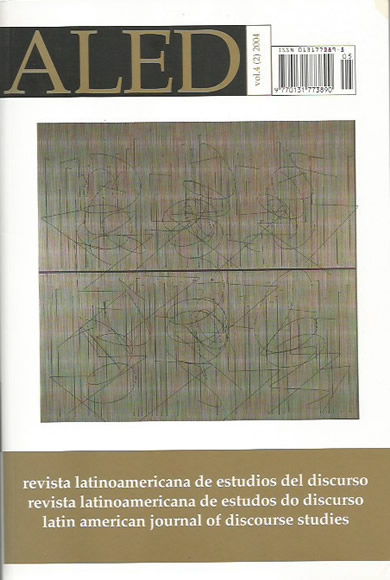Piquetes y piqueteros
Los actores sociales de la pobreza en la prensa argentina
Keywords:
critical linguistics. social representations. social actors constitution.Abstract
The analysis we present here is only a part of a long term research project whose aim is to show how the media present a new social practice and new social agents. The aim of this critical analysis is to point out the ways in which this new social practice (hacer piquetes) and these new social actors (los piqueteros) are presented in different Media focusing on how they define and make explicit the main features of the piqueteros and how their actions are narrated by Argentinean newspapers. Here we analyze the first conflict, that is, the conjuncture of Cutral.Có, April 1997, in which the signs piquetes”“piqueteros appeared for the first time in this neoliberal era. We have selected from our corpus two articles of the Argentinean newspapers “Clarín” and “La Nación”. Our methodology is that of Critical Linguistics: the roles assigned to the participants and the types of actions, processes as well as equative or attributive states are analysed starting from clause analysis (Hodge & Kress, 1993). Also the voices of mediators (Trew, 1979) that each newspaper uses to put in scene the voices of the conflict are examined.
Downloads
References
CHOULIARAKI, L. & N. FAIRCLOUGH (1999). Discourse in Late Modernity. Edimburgh: Edimburgh University Press.
HALLIDAY, M.A.K. (1985). Introduction to Functional Grammar. London: Edward Arnold.
HODGE, R. & G. KRESS (1993 [1979]). Language as Ideology. London: Routledge.
RAITER, A. (2001). Representaciones sociales. En Raiter, A., Zullo, J. & otros (Comps.). Representaciones sociales, pp. 9-29. Buenos Aires: EUDEBA.
SVAMPA, M. & S. PEREYRA (2003). Entre la ruta y el barrio. La experiencia de las organizaciones piqueteras. Buenos Aires: Biblos.
TREW, T. (1983[1979]). Lo que dicen los periódicos: variación lingüística y diferencia ideológica. En R. Fowler, R., Hodge, B., Kress, G., y Trew, T. (Eds.) Lenguaje y Control, pp. 159-211. México: Fondo de Cultura Económica.
VAN LEEUWEN, T. (1995). Representing social action. Discourse & Society, 6, 1, 81-107.
VOLOSHINOV, V. (1992[1929]). El marxismo y la filosofía del lenguaje. Madrid: Alianza.
ZULLO, J. (2001). ¿Ser pobres o estar pobres? Estados, procesos y acciones en la relación Estado / pobreza. En A. Raiter, J. Zullo & otros. Representaciones sociales, pp. 75-89. Buenos Aires: EUDEBA.
ZULLO, J. (2003). Los actores sociales de la pobreza: el caso Mosconi en “el gran diario argentino”. En Actas del IX Congreso Nacional de Lingüística. Sociedad Argentina de Lingüística. Universidad Nacional de Córdoba. Edición en CDROM.
Downloads
Published
How to Cite
Issue
Section
License

This work is licensed under a Creative Commons Attribution-NonCommercial-NoDerivatives 4.0 International License.
The authors retain the copyright and guarantee RALED the right to be the first publication of the work as well as a Creative Commons Attribution License that allows others to share the work with recognition of authorship and the initial publication in this journal.




